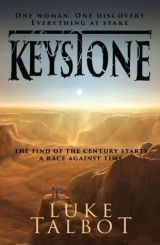
Текст книги "Keystone"
Автор книги: Luke Talbot
Жанры:
Триллеры
,сообщить о нарушении
Текущая страница: 12 (всего у книги 36 страниц)
Her aim had not been to just provide a substitute for meat; vegetarian products had been doing that for decades. She wanted to literally create a single product that could be transformed into any meat-based product. Indeed, to recreate the texture, taste and nutritional properties of animal meat, with none of the ethical or environmental ramifications.
She picked up a small pen-shaped instrument and placed its pointed end in the metal tray of nanoplasma. Turning a small wheel on the side of the pen, she selected ‘Rump Steak’ and pressed a red button. Within seconds, the nanoplasma had visibly changed, becoming more viscous and opaque. After about a minute, she pulled the pen out of the tray and looked at her work.
Now looking at a perfectly rectangular rump steak, she picked up a scalpel from the table and made a small incision across the middle. Prying the cut apart to reveal the bloodless cross section, she nodded approvingly and used the scalpel to cut the slab into three equal parts, before stacking them on a plastic plate and placing them in the sample fridge under the table.
“As soon as I make a steak-shaped receptacle, it won’t look like I just slaughtered a square cow,” she muttered under her breath.
She walked to the MLP’s communications console and depressed a button at its centre, before speaking into the microphone stalk.
“Hey guys, while you’ve been out there playing in the sand, I’ve been preparing this evening’s meal. How does rump steak and mash sound?” she said cheerfully.
There was a short wait, during which the Martian static undulated out over the MLP’s speaker system. The Russian replied, fainter than usual.
“That sounds great, Jane. Any way you can make a couple of cold beers using that nano-stuff of yours?”
“I second that,” Montreaux laughed.
She smiled and pressed the com button once more.
“Hey, as soon as I develop a nanocapsule that adds a kick, no problem. In the meantime, we’re going to have to make do with alcohol-free, if that’s alright with you?”
Captains Montreaux and Marchenko had driven Herbie to the very edge of Hellas Basin about two and a half kilometres from the MLP. Exiting the vehicle, they walked to the cliff apprehensively. They instinctively stopped two metres from the edge, and Montreaux let out a gasp.
The view they beheld was simply astonishing.
Hellas Basin was a crater, the largest visible asteroid impact crater in the Solar System, with a diameter of over two thousand three hundred kilometres. It had been created nearly four billion years earlier, and the debris field of the impact covered almost a third of the planet. The main bulk of the debris had formed a sloped rim of rocks and sand more than one hundred kilometres wide around its circumference. The MLP had landed on this rim almost three kilometres from the crater, but it was only when they stood at the very edge and looked back towards their landing site that the gentle slope down to Martian ‘sea level’ could be fully appreciated.
Looking the other way, towards the centre of the Basin, was a truly terrifying experience. From the very bottom of the crater to where Montreaux and Marchenko now stood was a height difference of almost nine kilometres. If Mount Everest had been placed in the centre, they would be looking down on its peak. As it was, they were looking down a steep slope, and across a wide expansive plain larger than India. The crisp Martian atmosphere gave them near perfect visibility, and only the curve of the horizon prevented them appreciating the crater fully.
In the distance, they could easily see the brilliant white reflection of frost that covered most of the floor of the crater.
Emboldened by curiosity after his initial shock, Montreaux edged closer to the precipice and looked down. Contrary to his initial impression, instead of a sheer drop, the crater sloped away from him, not as gently as the debris field behind him, but certainly not vertical either. He found himself comparing it to a tough ski slope: potentially deadly if he’d had skis on and it was covered in snow, but quite possible to clamber down given the circumstances. What did impress, however, was not the incline of the slope but its scale. Whereas on Earth he would have expected the drop to end after at the most a few hundred metres, the wall of the Hellas Basin did not. It continued on its way down, gradually levelling out as it neared the bottom like the inside of a soup bowl, until he imagined it must merge with the crater floor kilometres below. He had to ‘imagine’ where it met the bottom for two reasons, he surmised. Firstly, he calculated that with the depth of the crater and gradient of the slope, the intersection of ‘floor’ and ‘wall’ of the crater had to be at least fifteen kilometres away from him, and his ability to define accurate shapes at such distances without visual aid was quite low. This was in no way helped by his second reason, which was that as far as the eye could see, all the rocks and debris looked the same.
Looking to his left and right, he saw that from a distance, the crater rim looked like an unbroken ring of mountains, imprisoning the plain below.
The slope was made up of a mixture of varying sizes of rock and Martian soil. Almost everything was the same colour, a pale shade of orangey-brown. Occasionally a particular rock would be slightly darker or lighter, but there were few obvious geological variances, at least to his untrained eyes.
He looked over at Danny, who was kneeling at the edge examining a small spherical rock about the size of a baseball.
“Impressive, isn’t it?” he said.
The Russian looked up across the plain and nodded slowly before standing. He wrapped his fingers around the stone and bounced it in his palm a few times, getting a feel for its weight and balance. Without a word he stretched his arm back fully before sweeping it forwards in a flash, releasing the stone mid-swing. They watched the stone fly forwards at least a hundred metres before gravity started to bring it down to the ground.
The low gravity made for an impressive pitch indeed.
Because of the incline, the stone continued to fall for about three hundred metres before finally striking a large flat rock jutting out from the cliff-face. A small cloud of pale orange debris was thrown up from the rock as the stone bounced off and disappeared below.
“See if you can beat that,” he grinned and looked at Montreaux.
But Montreaux wasn’t listening. He was still looking down at the flat rock that the stone had struck; the dust had now settled and despite its distance, it was obvious that there was a striking difference in colour between the surface dust that had been disturbed and the rock beneath. It was jet black.
“Captain Marchenko, pass me the binoculars, please.”
He focussed the electronic device on the stone below. After several long minutes, he passed the binoculars back.
“Look at the flat rock you just hit,” he said, seriously.
Danny’s first instinct was to be sarcastic. He felt like saying that he was sorry he’d damaged a Martian rock, but that there were billions more identical ones where that came from. Instead, he took the binoculars and steadied the image on the flat rock.
“What do you think it is?” He didn’t move his eyes from the binoculars, but instead zoomed in further to examine the small patch of jet black stone that had been uncovered. They had spent days picking up rocks and digging test holes in the soil near their base, and had never seen anything like it.
Montreaux had already been thinking about his answer, and had remembered some basic facts from his early days at school. “Well, on Earth, a black colour in stone often comes from carbon.”
Marchenko pulled his eyes away from the binoculars and looked at the American.
“Carbon? From plants and animals?”
“Yes, I think, although I don’t know if it can be naturally occurring too.” He thought about this for a moment. “In any case, we’ll never know until we get down there to look at it. We’ll need a sample to take back to Dr Richardson.”
“Wow! That was one lucky throw!”
“It certainly was. Now, I propose that we climb down together, but first, we need fresh air, I only have half an hour’s worth left.”
They climbed down the cliff in parallel, connected by a thin strand of synthetic rope for safety. It was by no means a dangerous climb, and on Earth could certainly have been attempted with barely a second’s thought. But on Mars, the combination of reduced gravity and airtight suits made for a nervous descent for both men.
As they came within twenty metres of the flat stone, Montreaux paused and turned his upper body round to face it. He tugged sharply on the safety line to get Danny’s attention and pointed down at their goal.
“It’s definitely not your standard Martian rock formation, is it?” he said, out of breath.
“There’s something out of place about it, definitely. Something –”
“Not natural,” Montreaux finished his sentence for him, “I agree.”
From where they now sat, the stone betrayed not only its huge dimensions, but also its unexpected shape and orientation. It was about six metres wide and rectangular, protruding at least ten metres from the cliff-face.
Although it was difficult to tell with any accuracy from where they were sitting, the stone looked to be completely flat amidst the chaos of debris deposited around them.
“It looks almost like a,” Danny searched for the word. “Like a jetty, where you moor a boat on a riverbank.”
The two astronauts looked at each other and then continued to descend in silence. Montreaux checked the small LCD display on his forearm to ensure that his suit camera was capturing the whole event.
The Russian reached the stone first. He stood up to his full height and looked at Montreaux, who had continued past the stone and was now investigating below.
“This is incredible,” he said. “The stone comes right out of the cliff, it’s about a metre and a half thick, below is filled up with soil and other rocks, but apart from that you can clearly see the shape of the stone.” His voice was filled with awe. “This stone has to be artificial. The edge is perfectly flat all around, and wait.” His gloves had a built in rubber wiper along the seam of the thumb, for his own visor in case of sandstorms. He used it to scrape the stone clean. “Yes, that’s incredible! There’s a thick coat of dirt and dust, but underneath it’s the same jet black stone, and it’s so smooth!”
Danny was using his gloves to expand the impact crater that his small projectile had created.
“Same up here; it’s perfectly smooth. And whatever it is, it’s –”
Montreaux waited for him to finish his sentence, but the words didn’t come.
“Yes?” he pressed.
“Oh, my God,” Danny said, followed by a short burst of Russian that Montreaux didn’t understand. “Yves, get up here and look at this!”
Despite his usual friendly carefree attitude, Marchenko never referred to Montreaux using his Christian name. That was a break in protocol that only Dr Richardson enjoyed. Montreaux almost fell over himself reaching the top of the stone to join the Russian.
“What?” he said, urgently, glancing sideways at the stone.
He pointed to the patch of black surface he had uncovered. His hand was shaking visibly.
Captain Montreaux did not need it spelled out. What had stunned Danny had the same effect on him. His knees grew weak, and he sank down slowly until he could touch the stone. He ran his gloved fingers across it until they slotted neatly into a groove, about two centimetres deep and ten wide that ran in a perfectly straight line from under one edge of the cleaned area, near the wall of the crater out towards its centre. Danny’s gloved fingers had left small furrows where he had done his best to clear out most of the sand. After about sixty centimetres, the groove split in two in a perfect V. At the edges of the cleared area, he could make out the lines of two more possible grooves. He stood up and tilted his head as he examined the stone. The grooves made the shape of a V, pointing towards the crater wall, with a line emerging from its apex and disappearing into the cliff.
The grooves had been perfectly, and unmistakably, carved into the stone. And both astronauts immediately interpreted them in the same way: whatever had made the lines had intended them to point towards something that was now buried under the rock and debris of the cliff-wall.
They sat in silence for several minutes before Montreaux regained his composure. He pressed a button on his communicator pad and hailed the MLP.
“Dr Richardson, please confirm that you are getting the data feed from Captain Marchenko’s and my helmet cams.”
There was a momentary pause.
“Hi there. What am I looking at?” Jane said in a confused voice.
“Please confirm that you are getting this data feed and that it is being stored correctly, Dr Richardson,” he said plainly.
“That’s affirmative, Captain Montreaux, both feeds coming in, there’s a bit of atmospheric interference, a little worse than when we spoke earlier. But what the hell am I looking at?”
“We are out of your line of sight, I imagine that is causing the interference,” he explained. “Can you give a quick assessment of the material we are standing on?”
There was a long silence, after which the scientist spoke quite cautiously. “I would say from its colour that it could be an igneous rock, it resembles obsidian.”
“Igneous? Obsidian?” Montreaux asked.
She sighed. “Igneous rocks are basically cooled down magma that on Earth forms most of the crust,” she elaborated. “Basically, magma leaves the mantle, normally during movement of tectonic plates or during a volcanic eruption, for instance, and solidifies as it becomes part of the crust because it is further from the heated core of the planet. In theory, the closer the magma is to the surface when it hardens, the faster it will do so because the ambient temperature will be lower. If magma cools slowly, the solid crystals that form can easily be bigger than your fist. As the rate of cooling increases, however, so the size of those crystals decreases. If the magma is on the surface, what we would normally call lava, and the environmental conditions are just right, it can cool so fast that crystals hardly have the opportunity to form, in which case we get obsidian. In these cases, the crystals have to be observed under a microscope.”
Danny ran his hand along the smooth surface. “Could obsidian be this smooth, naturally?” he wondered.
“Absolutely. Polished obsidian was even used for mirrors thousands of years ago. I would expect a substance such as obsidian to be that smooth naturally. Danny, can you show me a more ground level view, please, from the edge of the stone across it?”
He obliged, climbing down the side of the stone that Captain Montreaux had just emerged from. He scanned the edge of the stone, and then raised his head slightly and tilted it down so that Jane would be able to appreciate how flat and rectangular it was.
“Fascinating,” she said eventually. “It looks perfectly flat, and the stills I have taken from the video feed suggest that the angled edges I have seen are all at ninety degrees.”
“What do you make of the grooves, Dr Richardson? Could they have been carved or etched into the surface?” Montreaux asked.
“No,” she replied. “At least not if the stone is indeed obsidian. Obsidian is very similar to flint, in that it splinters and creates flakes. Fantastic for making arrow heads and knives, but very difficult to craft, and virtually impossible to chisel or strike with any reliability. When used in ornaments nowadays, it is usually polished, so it’s relatively easy to create a smooth and accurate edge. However, a groove is entirely different: I don’t think you could polish a groove into a flat piece of stone, at least not a groove like that.”
“Can’t you use lasers?” Danny offered.
“Indeed you can. In fact the only useful application of obsidian I can think of right now is surgical knives. The blades of precision instruments can be fashioned using a laser. Because of the compact nature of the crystals that make up the rock, the width of obsidian blades can literally be measured in molecules, so they are hundreds of times more accurate than steel.”
“Stone knives?” Montreaux was amazed.
“Even now they’re still used in heart surgery, Yves,” she confirmed.
Montreaux took a step back and contemplated the stone beneath him. He found his eyes inexorably drawn towards the crater wall by the grooves. He wanted nothing more than an excuse to start digging like crazy, but if this was what he sensed it to be, then things would have to be done properly. “Dr Richardson?”
“Yes?”
He measured his words carefully, not wanting her to infer anything unprofessional. “Having seen the stone we are standing on, its dimensions, shape and,” he paused, as if looking for the correct terminology, “other characteristics, what do you think made it?”
“I am not a geologist by trade, Captain,” she replied without hesitation. “However, I have seen some incredibly unbelievable rock formations on Earth, particularly where cooling magma is involved. The grooves may have been set as the magma cooled, possibly the imprint of other stones, maybe even by water, which we know at some time existed in abundance in this area. This stone could be a naturally occurring phenomenon. I would need to see a sample.” She waited for a response, but none came. “And I would very much like to visit the stone myself,” she added.
Danny looked at Montreaux and winked. “Jane, cut the bullshit now, OK? We’ll use that last bit as a sound-bite for Earth, you sounded great,” he said. “Now tell us what you really think.”
“Danny, you are standing on a perfectly flat surface, as smooth as a pane of glass, with perfect parallel sides and straight edges, all seemingly at a perfect ninety degrees to each other,” she said. “Not only is the stone flat, it also appears to be horizontal, which is why you two aren’t slipping off it. It’s also jutting straight out of the side of the crater, possibly pointing directly to the centre of said crater. And to top it all off, there is a groove in its surface that is not only aligned with the stone itself, but is also uniformly one-point-eight centimetres deep and ten-point-six centimetres wide – I know because I’ve checked it from the video feeds you sent. Can any one of these features on their own be produced in the natural world? On Earth, certainly. On Mars? Who knows, but the laws of physics are no different here to back home, we simply have different environmental conditions. I would say that probably yes, too. Now you’re left with the big question.” She paused. “Is it possible for all of these features to be found together, in the same place, given the context of the stone?”
“Dr Richardson, I appreciate your thorough summation of the situation, but could you just give us a straight answer?” Captain Montreaux was getting uncharacteristically impatient. He knew what the answer was, he just wanted to hear her say it.
“Yves, I am a scientist, and we never say things of any major significance in anything less than five hundred words. But to be blunt, there is no doubt in my mind that what you are standing on was put there. And although I cannot believe I am even saying this, I am sure that you and Danny are not the first beings to have stood on it, either.”
There was a very long, weighted silence.
Captain Montreaux couldn’t help but remember the journey to Mars, the conversation with Lieutenant Su Ning, the suspicious circumstances of her death. He had known then that something big was going on, and things certainly didn’t get any bigger than this. On the one hand he was excited at the magnitude of their discovery, but on the other he knew that people were prepared to kill them to cover it up. His heart sank. He knew deep down that nobody back on Earth of any importance to him would ever find out about their discovery. He also now knew why they had landed on the northern edge of the Hellas Basin rather than any other, and why the pre-planned coordinates of their rover expeditions had been so exact. And now that they had found the Jetty, what next?
If this is going to be part of a cover up, he thought, how likely is it we’ll be allowed to return home alive?
“What do we do now?” Danny broke the silence.
Montreaux looked over at him, hoping that the reinforced Plexiglas of his helmet did not reveal anything. “I have an hour of air left in this cylinder, how about you?”
“About the same. And we have three hours more in Herbie.”
“Dr Richardson,” Montreaux hailed her.
“Yes?”
Through the environmental interference on the com system, Montreaux fancied he could detect something odd in her tone, a hint of self-assuredness, of knowing, and suddenly an alarming thought materialised: was she in on it? Were they both? The dark thoughts crystallised, only making sense now, as he stood on the alien stone with the enormity of the situation staring him right in the face. Did either of them know of the cover-up because they were involved? He had a momentary flashback of Dr Richardson and Captain Marchenko the previous day, having one of their friendly arguments. As they did every day, he thought. He swallowed hard. Was he the only one not in on the cover-up? Was he going to be next?
“Captain?”
Danny’s voice came through faintly in his earpiece. He cocked his head and looked at the Russian. Suddenly extremely self-conscious, he realised that he must have been looking into space for quite some time.
“Yves, are you alright?” Jane sounded genuinely concerned.
He snapped out of his daydream in an instant. Nonsensical paranoid delusions, he concluded.
“Dr Richardson, you’d better put a hold on those steaks, for an hour or so.” He gestured towards the wall of the crater, to where the groove in the stone disappeared. “Captain Marchenko, let’s get some tools from Herbie and find out where this groove goes.”
From its viewpoint two thousand metres further along the edge of the Hellas Basin impact crater, Beagle watched the two figures ascend the crater wall. Using a high-resolution lens, it zoomed in on the black object, three hundred metres below, upon which they had been standing moments earlier.
The rover edged forward slowly, coming to a halt against a small round rock which hid most of its body from the direction of the MLP.
The lens re-focused on the object, picking out the grooves in its surface.
It started taking pictures.








